
Tigran Vartanovich Petrosian was a Soviet-Armenian chess grandmaster and World Chess Champion from 1963 to 1969. He was nicknamed "Iron Tigran" due to his almost-impenetrable defensive playing style, which emphasized safety above all else. Petrosian is often credited with popularizing chess in Armenia.

Mikhail Nekhemyevich Tal was a Soviet-Latvian chess player and the eighth World Chess Champion. He is considered a creative genius and is widely regarded as one of the most influential players in chess history. Tal played in an attacking and daring combinatorial style. His play was known above all for improvisation and unpredictability. Vladislav Zubok said of him, "Every game for him was as inimitable and invaluable as a poem".
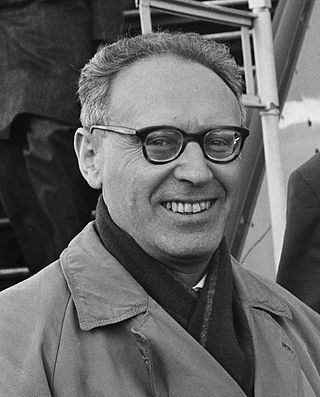
Mikhail Moiseyevich Botvinnik was a Soviet and Russian chess grandmaster who held five world titles in three different reigns. The sixth World Chess Champion, he also worked as an electrical engineer and computer scientist and was a pioneer in computer chess. He also had a mathematics degree (honorary).

Vasily Vasilyevich Smyslov was a Soviet and Russian chess grandmaster, who was World Chess Champion from 1957 to 1958. He was a Candidate for the World Chess Championship on eight occasions. Smyslov twice tied for first place at the USSR Chess Championships, and his total of 17 Chess Olympiad medals won is an all-time record. In five European Team Championships, Smyslov won ten gold medals.

The USSR Chess Championship was played from 1921 to 1991. Organized by the USSR Chess Federation, it was the strongest national chess championship ever held, with eight world chess champions and four world championship finalists among its winners. It was held as a round-robin tournament with the exception of the 35th and 58th championships, which were of the Swiss system.

Paul Keres was an Estonian chess grandmaster and chess writer. He was among the world's top players from the mid-1930s to the mid-1960s, and narrowly missed a chance at a World Chess Championship match on five occasions. As Estonia was repeatedly invaded and occupied during World War II, Keres was forced by the circumstances to represent the Soviet Union and Nazi Germany (1941–44) in international tournaments.

Leonid Zakharovych Stein was a Soviet chess Grandmaster from Ukraine. He won three USSR Chess Championships in the 1960s, and was among the world's top ten players during that era.

Jørgen Bent Larsen was a Danish chess grandmaster and author. Known for his imaginative and unorthodox style of play, he was the second-strongest non-Soviet player, behind only Bobby Fischer, for much of the 1960s and 1970s. He is considered to be the strongest player born in Denmark and the strongest from Scandinavia until the emergence of Magnus Carlsen.
A game of chess can end in a draw by agreement. A player may offer a draw at any stage of a game; if the opponent accepts, the game is a draw. In some competitions, draws by agreement are restricted; for example draw offers may be subject to the discretion of the arbiter, or may be forbidden before move 30 or 40, or even forbidden altogether. The majority of draws in chess are by agreement.
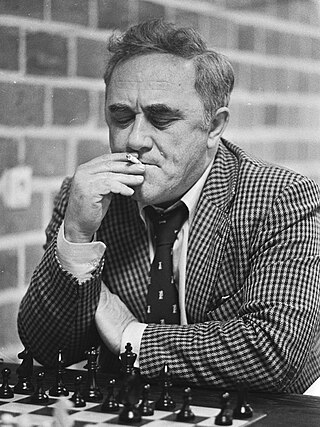
Efim Petrovich Geller was a Soviet chess player and world-class grandmaster at his peak. He won the Soviet Championship twice and was a Candidate for the World Championship on six occasions. He won four Ukrainian SSR Championship titles and shared first in the 1991 World Seniors' Championship, winning the title outright in 1992. His wife Oksana was a ballet dancer while his son Alexander was also a chess master. Geller was coach to World Champions Boris Spassky and Anatoly Karpov. He was also an author.
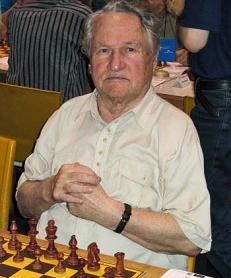
Ratmir Dmitrievich Kholmov was a Russian chess Grandmaster. He won many international tournaments in Eastern Europe during his career, and tied for the Soviet Championship title in 1963, but lost the playoff. Kholmov was not well known in the West, since he never competed there during his career peak, being confined to events in socialist countries. His chess results were impressive, so this may have been for security reasons, as Kholmov had been a wartime sailor. But he was one of the strongest Soviet players from the mid-1950s well into the 1970s, and was ranked as high as No. 8 in the world by Chessmetrics.com from August 1960 to March 1961. Kholmov stayed active in competitive chess right to the end of his life, and maintained a high standard of play past the age of 80.
There have been two chess matches featuring USSR vs. Rest of the World, in 1970 and 1984, and one match Russia vs. Rest of the World, in 2002. The USSR team won the first two matches and the "Rest of the World" team won the third match.

At the World Chess Championship 1963, Tigran Petrosian narrowly qualified to challenge Mikhail Botvinnik for the World Chess Championship, and then won the match to become the ninth World Chess Champion. The cycle is particularly remembered for the controversy surrounding the Candidates' Tournament at Curaçao in 1962, which resulted in FIDE changing the format of the Candidates Tournament to a series of knockout matches.
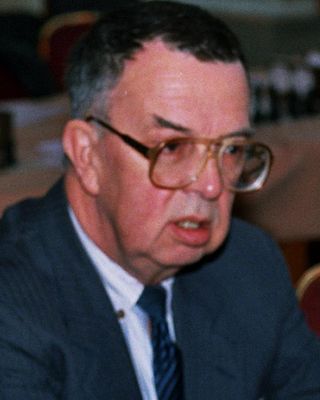
Nikolai Vladimirovich Krogius was a Russian chess Grandmaster, International Arbiter (1985), psychologist, chess coach, chess administrator, and author. He won several tournament titles at Sochi and in Eastern European events, and appeared in seven Soviet finals from 1958–71. His peak was in 1967 when he ranked 18th in the world for a time. He earned his doctorate in psychology, and specialized in sports psychology. He coached World Champion Boris Spassky for several years, also served as chairman of the USSR Chess Federation, and co-authored five chess books. He was the co-winner of the 1993 World Senior Chess Championship.

Viktor Lvovich Korchnoi was a Soviet and Swiss chess grandmaster (GM) and chess writer. He is considered one of the strongest players never to have become World Chess Champion.

Semyon Abramovich Furman was a Soviet chess player and trainer of Belarusian Jewish origin. He was awarded the title of Grandmaster by FIDE in 1966. Furman is best known for developing Anatoly Karpov into a World Chess Champion, but was a formidable player himself, as well as a successful coach for several other world-class players. His name is sometimes written as Semen or Semion Furman.
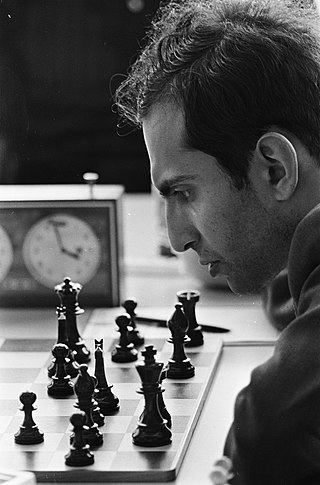
The 1957 Soviet Chess Championship was the 24th edition of USSR Chess Championship. Held from 20 January to 22 February 1957 in Moscow. The tournament was won by Mikhail Tal. The final were preceded by quarterfinals events at Frunze, Tallinn, Yerevan ; semifinals at Leningrad, Kharkov and Tbilisi.














